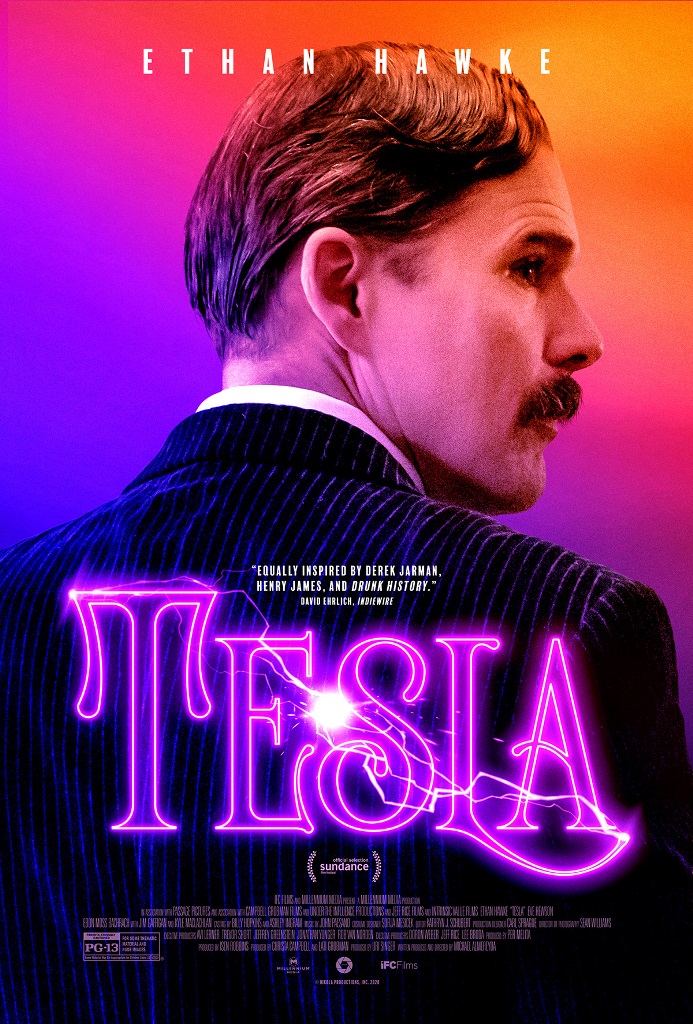Ethan Hawke in Tesla



The problem with depicting genius in film is that we don’t understand genius. We don’t know where it comes from, why it varies in degree, or why it sometimes, inexplicably, leaves. Genius is a part of the human condition that we understand even less than love. Most films about geniuses are just that: about geniuses. They are not about genius. Good Will Hunting is about everything except Will Hunting’s math genius, that is simply treated as a personal fact, like his roots in South Boston or his blonde hair. Similarly, Shakespeare in Love never bothers examining the nature of Shakespeare’s gift; instead we’re treated to a tale more interested in the way Shakespeare’s stories have shaped storytelling for centuries. One of the only films to really tackle genius itself in a meaningful way is Amadeus, which presents Mozart as an incredibly annoying person whose mere existence crushes the spirit of everyone around him. Tesla, Michael Almereyda’s biopic of Nikola Tesla, tries to be about both the genius and genius itself, and it does not work on either front.
Almereyda makes some interesting choices which suit an idiosyncratic figure like Nikola Tesla well. Anne Morgan (Eve Hewson), daughter of JP and potential love interest of Tesla, narrates the film, using Google searches and documentary-style photographs to fill in the gaps of Tesla’s life. At one point, Thomas Edison (Kyle MacLachlan) pulls out a smartphone and starts scrolling, connecting the past to the modern world Tesla helped build. Scenes of Tesla experimenting with electricity are staged against matte paintings and look like theater scenes—it’s easy to imagine this film being restaged as a play. Even when they don’t work, most of these decisions at least make Tesla different from the usual Great Man biopic. But by the point that Tesla begins singing karaoke to “Everybody Wants to Rule the World”, I was ready to slam my head in a door. Tesla does not understand Tesla, and not even a committed performance by Ethan Hawke can save it.
To be fair, I don’t think anyone understands Tesla. The man was so far ahead in his thinking that he was basically living on a different plane of existence. Tesla attempts to capture that, to show how the taxes of his genius left him alienated, alone, and broke, that his singular dedication to science cost him any chance of a “normal” personal life, including love, family, and marriage. But Tesla makes a mistake in assuming that this is 1) the most interesting thing about Nikola Tesla, and 2) anything he ever desired for himself. This is a man who changed our world several times over, and this movie is like, But what if he DID have a girlfriend?!
More egregious still is how BORING Tesla is. Hawke is great in the role, capturing Tesla’s fastidiousness without making a spectacle of it, and he successfully suggests a man whose mind is always a thousand miles ahead of everyone around him, but even with Almereyda’s inventive touches surrounding Hawke’s nuanced performance, Tesla plods along, Anne Morgan’s constant voiceover making it feel more like a lecture and less like a story. That’s the challenge with Nikola Tesla—how do you tell a story about a man we barely understand? Almereyda makes an honest attempt, but he can’t grasp the details of Tesla better than anyone else can at this moment in time. He touches on many facets of Tesla’s life, breezing through the current war with Westinghouse and Edison, removing to Colorado, his fraught interactions with JP Morgan, his brushes with Gilded Age celebrity, but in the end, despite the many stylistic flourishes, Tesla can’t make any of it add up to something interesting.
Perhaps the problem is that in telling a story about Tesla and his genius, we must first make him understandable, and we are simply not equipped to do that. We can’t really see Tesla beyond the hucksterism of the current war or his later-in-life eccentricities, like his so-called “death ray” or the fact that he claimed to love a pigeon. To tell a resonant story about Tesla, one would have to embrace this strangeness much as Milos Forman and Peter Shaffer embraced Mozart’s crudity. Tesla attempts it, offering many creative flourishes, but none of them illuminate the man beyond what we know of him as a failed businessman who died broke. As much as Almereyda tries to do justice to such an extraordinary mind, he ultimately still frames Tesla within pedestrian concerns like his business interests and the question of why he never married. Tesla remains as much an enigma today as he was in his life—he’s an unquestionable genius of staggering capacity, but we simply cannot grasp what that means as a human experience.
